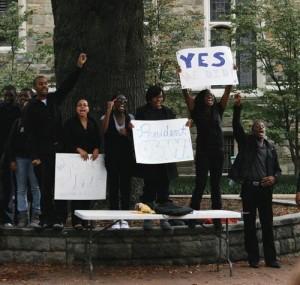The Foundation for Individual Rights in Education, a nonprofit group aimed at defending civil liberties in U.S. universities and colleges, has recently named Georgetown a “red-light institution” in regards to the university’s restrictive speech policies.
Georgetown has joined the ranks of Tufts University, Johns Hopkins University and the University of California, Los Angeles, which have all received the “red-light” ranking from FIRE. A “red-light institution,” according to FIRE’s Web site, is a university or college that has at least one policy that limits freedom of speech on campus.
As a private university, Georgetown is not required to follow the First Amendment, which provides free speech to all government and non-private institutions. Georgetown, though, does specifically state in their Speech and Expression policy, instituted in 1989, that all members of the Georgetown community have the right to free speech.
“Georgetown University is committed to standards promoting speech and expression that foster the maximum exchange of ideas and opinions,” the policy states. “First, all members of the Georgetown University academic community, which comprises students, faculty and administrators, enjoy the right to freedom of speech and expression. This freedom includes the right to express points of view on the widest range of public and private concerns and to engage in the robust expression of ideas.”
University spokesperson Julie Bataille said that this policy suits the university’s ideals.
“Georgetown’s speech and expression policy holds true to our mission as a university – as a place where ideas and information are freely exchanged,” she said.
Despite this proclamation of free speech across campus, FIRE insists that several policies restrict this promise. The first problem area, according to Samantha Harris, the author of FIRE’s article on Georgetown’s policies, falls under Georgetown’s Student Code of Conduct’s harassment policy, which calls harassment “any intentional or persistent act(s) deemed intimidating, hostile, coercive or offensive.”
FIRE reads this as a contradiction of free speech because of a 1989 Supreme Court ruling.
“Given that the prohibitions in this policy are all given in the alternative, the policy literally prohibits any `intentional act deemed offensive’ at Georgetown University,” Harris wrote. “This directly contradicts the Supreme Court’s holding that `If there is a bedrock principle underlying the First Amendment, it is that the government may not prohibit the expression of an idea simply because society finds the idea itself offensive or disagreeable.'”
FIRE added that this policy could be easily altered with the removal of the “or” and replacing it with an “and.”
“These simple revisions would bring Georgetown’s definition of harassment much closer to the U.S. Supreme Court’s definition of what constitutes harassment in the educational context: conduct `so severe, pervasive and objectively offensive that it denies its victims … equal access to education,'” Harris wrote.
Bataille said that Georgetown’s current policy is not meant to limit the university’s community.
“The remedy for silly, extreme or offensive ideas is not less free speech, but more,” she said, “and this is the philosophy with which our speech policy is applied at Georgetown.”
FIRE raises several other concerns in the university’s Code of Conduct policies, including issues with the prohibition of disorderly conduct, the prohibition of “incivility” directed at university officials and the placement of the Ethos Statement, which requires Georgetown students to uphold the Honor Code. FIRE said financial limitations on speeches and punishments for offensive acts within the university’s Speech and Expression Policy, are not in accordance with Supreme Court rulings either.
Bataille said that the university’s Speech and Expression Committee will look into concerns as needed.
Samantha Harris, the author of the FIRE’s piece on Georgetown, declined to comment for this report.
“








